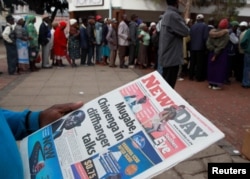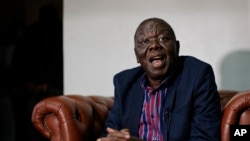Robert Mugabe, the longtime president of Zimbabwe, made his first public appearance Friday since the military placed him under arrest earlier this week.
The frail leader, dressed in a blue and yellow academic gown and a mortar board, attended a graduation ceremony in Harare, the capital, where the crowd cheered him.
Zimbabweans are hoping for a speedy and smooth resolution to their nation's sudden political crisis, as opposition figures, civil society and religious groups urge Mugabe to step down in the wake of a military takeover.
But reports Thursday said Mugabe was resisting, and South Africa’s president, Jacob Zuma, dashed hopes of a quick final act, telling his parliament, “It is too early to take any firm decision now.”
Pictures released on official media in Zimbabwe Thursday showed Mugabe standing beside military boss Constantino Chiwenga. The 93-year-old leader’s television appearance was his first public sighting since being placed under house arrest Tuesday by military forces as they seized control of the southern African country in a swift and bloodless operation.
The military said it was holding talks with Mugabe. He was taken to the State House Thursday for talks with the military and South African mediators.
Donald Yamamoto, the U.S. assistant secretary of state for African Affairs said the U.S. is hoping Zimbabwe is set to enter “a transition to a new era.”
Analyst Knox Chitiyo of the Chatham House research institution, was in Harare when the military deployed its tanks on Tuesday. Chitiyo, who is Zimbabwean, says the longer the military is perceived to be in charge, the more unstable things will become.
“The key issue is the time scale," he told VOA in Johannesburg. "The military will want...these negotiations to be completed, as quickly as possible. They want to have the president, or if it’s acting president, in place as soon as possible. They want an interim administration announced, I think, as soon as possible. The military does not want this to drag out, because the longer all this drags out, the murkier, the messier it could become.”
Some key figures in Zimbabwe’s opposition are proposing a transitional government ahead of the elections already planned for next year.
Opposition leader Morgan Tsvangirai on Thursday urged Mugabe to resign.
“Mr. Robert Mugabe must resign, step down immediately in line with the national sentiment and expectation, taking full regard of his legacy and his contribution to Zimbabwe, pre- and post-Zimbabwe," he told reporters in Harare.
The vice president whom Mugabe recently fired – arguably the catalyst for this military takeover - has kept a low profile. Emmerson Mnangagwa, says Piers Pigou of the International Crisis Group, will lose credibility if he appears too close to the military.
“It’s absolutely critical for the new incumbent to be able to, I suppose, be able to distance themselves from the illegal actions of the armed forces here, or ostensibly what looks like it," he told VOA. "I simply don’t know how they’re going to put lipstick on that pig.”
But, Chitiyo says, the negotiators have a lot to discuss. The crisis came out of a long-running, bitter rift in the ruling ZANU-PF party, which Mugabe has led for decades. Observers saw the move to fire Mnangagwa as a step toward the installation of Mugabe's wife, Grace Mugabe, as vice president. That would have put the unpopular first lady in line to someday replace her 93-year-old husband.
“It’s very delicate, there’s also negotiations within the party, between the party and the opposition, between the powers that be currently and South Africa and the region," Chitiyo said. "So there’s multiple negotiations, delicate negotiations. Too much talk too soon could do more harm than good. I think that’s what the military is saying.”
The military insists this is not a coup, and the powerful war veterans’ association called the action a “bloodless correction.”
For that narrative to work, however, they need one thing that no one ever thought would be easy to get: for Zimbabwe’s fiery, passionate leader to leave without a fight.






